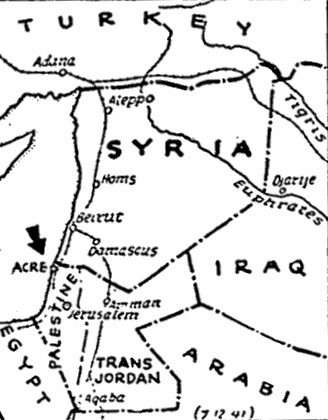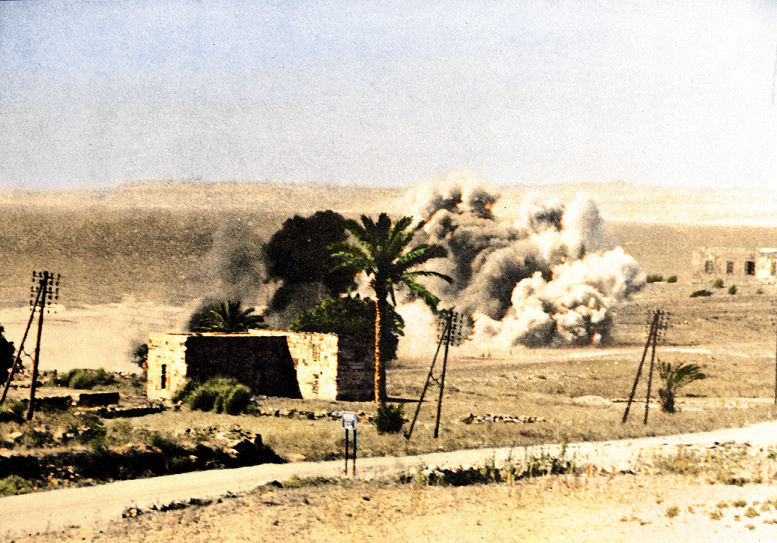The Pittsburgh Press (July 12, 1941)
‘FINAL’ TRUCE ENDS SYRIAN WAR
…
Vichy general sees British for armistice terms
…
By Edward W. Beattie Jr., United Press staff writer

The arrow in the map above indicates Acre where the British and General Henri Dentz, Vichy commander, discuss armistice terms as the Syrian war finally ends.
London, July 12 –
Fighting stopped in Syria last midnight (6 p.m. ET, Friday) when General Henri Dentz, Vichy commander-in-chief, accepted British armistice proposals as a basis for negotiations, it was said authoritatively today.
General Dentz is now at Acre, on the Palestinian coast south of Syria, conferring with General Sir Henry Maitland Wilson, the British commander-in-chief, after crossing the British lines with officers of his staff.
Ankara reported that Britain’s armistice terms to Vichy carried a 96-hour time limit and it was believed the limit for acceptance was midnight Sunday.
U.S. consul aids parleys
General Dentz was reported to have passed through the British and Free French lines at 5 a.m. (11 p.m. ET, Friday).
Authoritative informants said an interruption of communications between Beirut and Washington had caused delay in General Dentz’s acceptance of the British terms as a basis for negotiation.
Frederick Van H. Engert, American consul-general at Beirut, had agreed to transmit General Dentz’s reply, it was said.
The Vichy government stepped into the picture yesterday by announcing its own rejection of the British terms but left it up to General Dentz to make the final decision.
Then fighting stopped
It was said authoritatively that General Dentz asked the British to send plenipotentiaries to a specified point to meet his own delegates.
Then, informants said, he gave the order to cease fire between midnight and 1 a.m. and fighting stopped.
After the “ceasefire” had been sounded, plenipotentiaries of both armies net and at once started talks.
London heard that General Dentz himself was in Acre but an official dispatch from Beirut said General Dentz had sent representatives to Palestine.
It was said authoritatively that the Vichy plenipotentiaries, carrying a white flag, met British envoys at a spot on the Beirut-Acre Road.
There was no information here on the British terms.
A dispatch from Acre said that the Vichy government was also represented by General de Verdillac, General Sir Henry Maitland Wilson, British commander in Palestine, and General Georges Catroux, commander of the Free French forces, were the Allied negotiators.
As regards reports that Britain had demanded the surrender of Vichy warships in Syrian waters, it was said authoritatively that the French ships which have arrived at Alexandretta, Turkey, to be interned are only small craft and fleet auxiliaries.
Campaign is over
It was taken for granted here that the 34-day campaign, started June 8 when British and Free French forces marched into Syria over the Palestinian and Iraqi frontiers to avoid the possibility of a German attack, was now definitely at an end.
It meant the formation for the first time since the collapse of France a year ago, a solid anti-Axis bloc embracing a big area of the Middle East.
One of the direct threats to the Suez Canal had been ended and Britain was put in much better position to defend India.
Before the end of summer, it was suggested, General Sir Claude Auchinleck, the new British commander-in-chief in the Middle East, may be able to throw even heavier forces against the Germans and Italians in North Africa.
It had also been reported that the British plan to send a huge army to aid Russia by way of Iran when the Syrian campaign ended.
A sudden flare-up of air raids in Italy and Sicily was believed to indicate here that the British High Command might believe that in attacking Russia, Germany had given it a welcome opportunity to clear up the situation in North Africa.
Naples and Syracuse, both of which have been raided this week, are important harbors for the supplying of German mechanized and air force units in Libya.
The capitulation of Syria would release British light naval forces for the Central Mediterranean.

